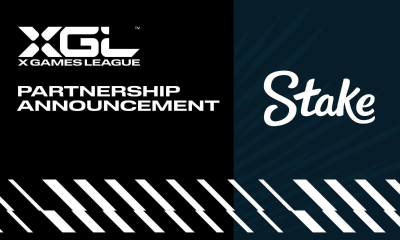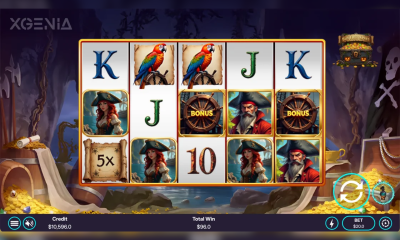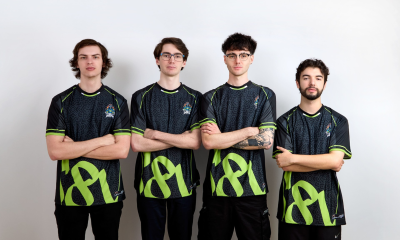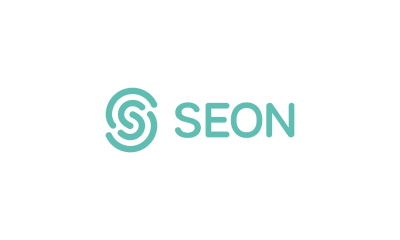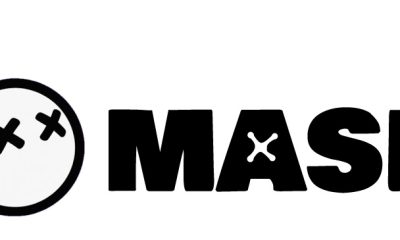Central Europe
German games market in 2023: strong development in turbulent times
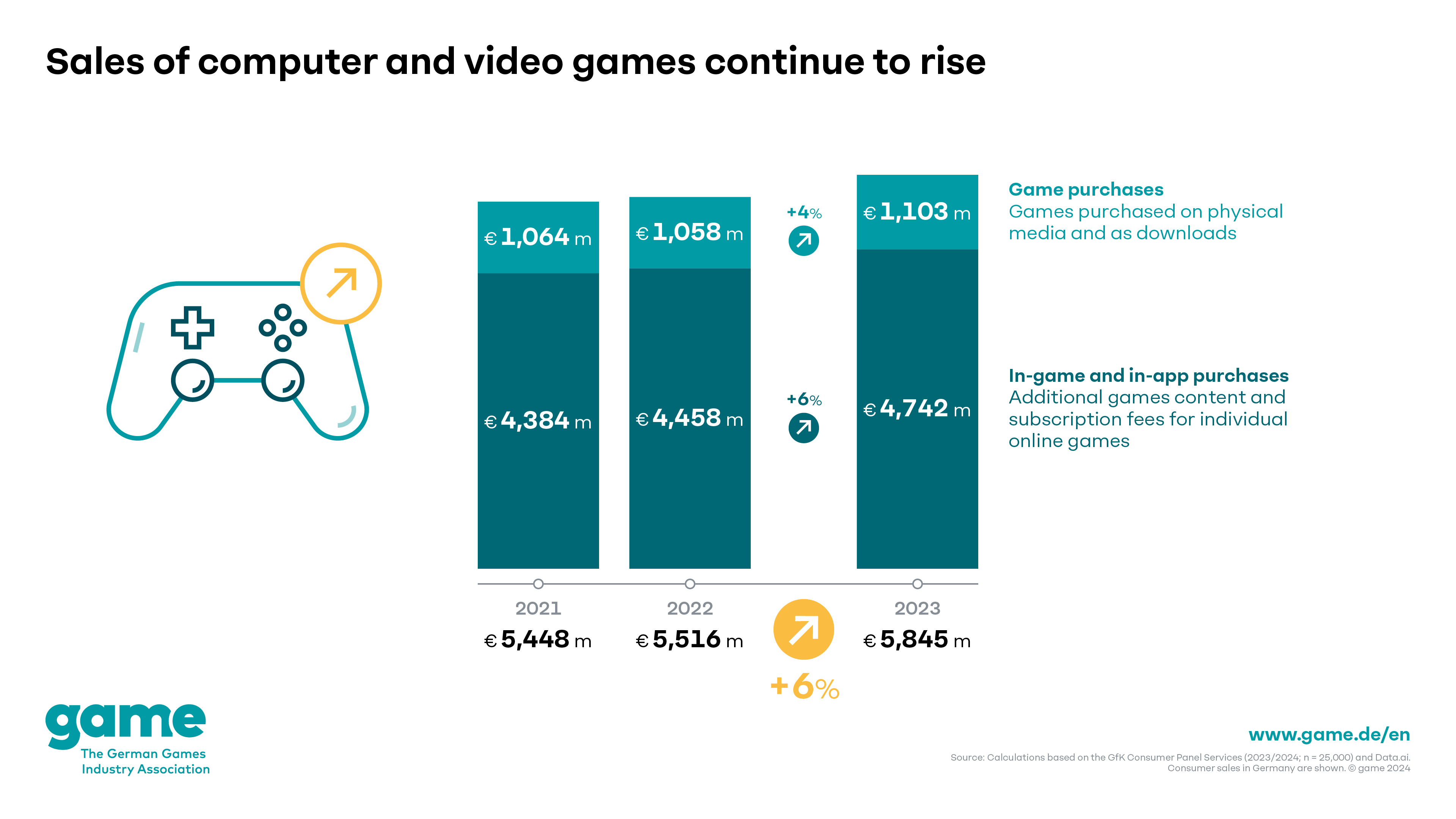
The German games market once again grew significantly overall in 2023: sales of games, games hardware and gaming online services rose by 6 per cent to around 9.97 billion euros. This is a significant increase after sales had only risen by 1 per cent in the previous year. The biggest growth drivers include games consoles and their accessories as well as in-game and in-app purchases. Despite the large number of top-class titles, which increased sales of games purchases by 4 per cent, the number of games sold fell by 8 per cent at the same time. There were also significant declines in some cases for gaming PCs and laptops. The data on the German games market is based on surveys conducted by the consumer panel services GfK and data.ai. The different developments in the individual market segments also show that 2023 was a year of contrasts for the games industry as a whole: on the one hand, more high-calibre titles were released within twelve months than ever before. On the other hand, some sales expectations were not met, particularly due to this abundance of outstanding games. Combined with generally high interest rates and a slowdown in the investment market, a wave of consolidation began worldwide, as a result of which developer studios are still being downsized or even closed and jobs are being cut.
‘The German games market continues to grow, but a close look at the data shows just how challenging these times are for game companies,’ says Felix Falk, Managing Director of game. ‘This is particularly true for small to medium-sized companies in Germany, most of which have only thin capital cover and therefore feel the impact of the tougher investment climate especially quickly. In such turbulent times reliable and internationally competitive political solutions are needed more than ever.’
Major differences between categories of games hardware
Sales revenues from various categories of games hardware developed very differently last year. Game consoles were among the most important growth drivers, posting a revenue increase of 44 per cent to break the billion-euro threshold, with total revenues of 1.1 billion euros. Demand for game console accessories was similarly robust, if at a slightly lower level. Sales revenues in this area jumped 32 per cent, to 374 million euros. In stark contrast, gaming PCs registered a clear decline as revenues from PCs and laptops marketed specially for games dropped by 17 per cent, to 547 million euros. Accessories for gaming PCs – including special input devices, graphic cards, etc. – fared only slightly better, with revenues falling by 7 per cent, to just under 1.3 billion euros.
‘Last year was the first year in a long time in which all current game consoles were easily available on the market,’ says Felix Falk. ‘The huge revenue gain in this category in 2023 shows how great the pent-up demand was among players. On the other hand, there was a clear drop in sales revenues from gaming PCs. After investing in PCs and laptops during the Covid-19 pandemic, a lot of video game players seem to be well-equipped for the moment.’
Sales revenue from games rises and gaming online services stabilise at a high level
Sales revenue from games developed positively overall in 2023. Across all platforms, purchases of PC and console games generated 4 per cent more revenue than in the year before. Total sales revenues in this area increased to around 1.1 billion euros. Considering the many high-quality game releases, however, this rise seems rather low. Indeed, the number of games sold actually dropped by 8 per cent. This reveals that the growth in revenue here is attributable exclusively to higher average prices. Last year, many video game players appear to have purchased high-quality titles shortly after their release and not waited for discounts. Also, because many of the top titles of 2023 are especially time-intensive, they didn’t leave room for players to acquire a larger number of games. In contrast, the market development for in-game and in-app purchases was significantly more positive, showing a revenue increase of about 6 per cent, to 4.7 billion euros. From an upgrade in a player character’s armour, to a season pass with a lot of additional content, to completely new campaigns, it has become ever more common for the playing time of a game to be extended or individualised through additional content. This trend continued in 2023. In-game sales revenues contribute significantly to covering continuously rising game development costs.
After a number of years of strong growth, sales revenues from online gaming services stabilised at a high level. Among the categories in this segment are fee-based subscription services that provide access to a large selection of games, cloud-based gaming, online multiplayer functions and the ability to save game progress in the cloud. Examples of these services include EA Play, Nintendo Switch Online, PlayStation Plus, Xbox Game Pass and Ubisoft+. Revenue from these services fell by 1 per cent in 2023, to 860 million euros.
The post German games market in 2023: strong development in turbulent times appeared first on European Gaming Industry News.
Birgit Wimmer
Birgit Wimmer Named Chairwoman as NOVOMATIC AG Reshapes Supervisory Board

“As Chairwoman of the Supervisory Board, I look forward to working together with my colleagues on both the Supervisory Board and the Executive Board as we help to successfully shape the Group’s strategic and sustainable development,” says Birgit Wimmer.
Dr. Haig Asenbauer, an internationally experienced lawyer with particular expertise in cross-border M&A transactions, company reorganization, and complex investment structures, was elected to serve as Deputy Chairman. Martina Flitsch retains her position as a Member of the Supervisory Board. She has many years of experience in international group structures and in providing strategic and legal support for corporate investments. Dr. Robert Hofians, a recognized finance and capital markets expert who also has extensive experience in the fields of governance and regulation in his roles as a professor and public accountant, also remains a Member of the Supervisory Board.
As of January 1, 2026, the Supervisory Board of NOVOMATIC AG is now composed as follows:
- Birgit Wimmer, MSc., MBA (Chairwoman)
- Dr. Haig Asenbauer (Deputy Chairman)
- Martina Flitsch (Member)
- Dr. Robert Hofians (Member)
The post Birgit Wimmer Named Chairwoman as NOVOMATIC AG Reshapes Supervisory Board appeared first on Eastern European Gaming | Global iGaming & Tech Intelligence Hub.
Central Europe
Ring Casino in Nürburgring at the Finish Line with NOVOVISION

The Ring Casino at the Nürburgring Congress Hotel has successfully deployed Novomatic’s NovoVision Casino Management System. As a branch of Spielbank Bad Neuenahr, the property integrated this visionary CMS to centralize operations and modernize its daily workflow. Beyond operational efficiency, the move ensures full compliance with upcoming German regulatory shifts, leveraging NovoVision’s advanced modules to uphold the highest standards in player protection and responsible gaming.
The venue offers around 450 square metres of gaming fun for fans of high-speed entertainment, with 62 video slots offering a range of attractive jackpots. All the gaming terminals are now managed centrally via NOVOVISION Floor Control, and jackpot management, cash handling via TITO and accounting are also operated in real time via the diverse system functionalities of NOVOVISION. In particular, access control via NOVOVISION access, player management and database comparison of each visitor with the nationwide OASIS exclusion database were key decision-making criteria for the operator. Both during initial registration and on each subsequent visit to the casino, access at the gates is only granted after thorough verification of the guest’s identity and age, as well as re-/verification against the exclusion database.
Following the successful introduction of NOVOVISION at the Ring Casino am Nürburgring, rollout at the other two locations in Bad Dürkheim and in Bad Neuenahr will follow in the first quarter of 2026.
Marcin Kozlowski, Head of Product Development & Market Coordination NBS, said: “Being able to supply Spielbank Bad Neuenahr, a long-standing NOVOMATIC customer, with our CMS as the core of its casino operations is further confirmation of our excellent business relationship. I would like to take this opportunity to thank the management for the trust they have placed in us and the teams for their excellent cooperation both in the run-up to and during the implementation.”
Thomas Salinger, Technical Director of Gaming at Spielbank Bad Neuenahr GmbH & Co. KG, said: “The successful introduction of NOVOVISION at the Spielbank in Nürburg represents a first major and important milestone in the system implementation in our gaming venues. This powerful casino management solution, with its diverse system functionalities, enables us to meet the ever-growing regulatory requirements efficiently and in a future-proof manner. We look forward to continuing the joint implementation in our casinos with our long-standing business partner NOVOMATIC.”
The post Ring Casino in Nürburgring at the Finish Line with NOVOVISION appeared first on Eastern European Gaming | Global iGaming & Tech Intelligence Hub.
Central Europe
ScatterKings adds sugar-coated spin to Austria with bespoke win2day partnership

ScatterKings has made its debut in Austria, partnering with operator win2day to bring its vibrant, hand-crafted portfolio to one of Europe’s most tightly regulated markets.
Headlining the partnership is Sweet win2day, a mouth-watering title designed exclusively for the operator. Other standout ScatterKings games, including Coins of Cleo, Vikings and Hogs Christmas and Big Bob, have also hit the screens of win2day’s customers, with further releases scheduled to follow.
Win2day is operated by Austrian Lotteries, which was founded more than 50 years ago and holds the only licence to offer online casino gaming in the country. The brand has gained a rich heritage as a trusted name in the market, priding itself on being one of the industry’s most responsible operators.
Through this deal, the new and fiercely passionate provider is redefining what modern slot content looks like for local players.
For ScatterKings, every game stands as a testament to its philosophy – proven mechanics fused with genuine artistic vision. A true labour of love from battle-tested developers, the brand-new studio, years in the making, is channelling its expertise into games crafted with soul.
With a leadership team of seasoned industry veterans spanning years of experience, ScatterKings is primed to accelerate its global growth and continue building games that deliver non-stop thrills.
Steven Cross, CCO at ScatterKings, said: “Our launch with win2day is such a proud moment for us and it’s a partnership built on trust in both our vision and craft.
“Entering such an exclusive market is a powerful endorsement of the quality and personality our content brings. We’re here to deliver premium entertainment to players under the most respected regulatory standards.”
Georg Wawer, Managing Director at win2day, said: “As Austria’s only licensed online gambling operator, it is our responsibility to offer players exclusively high-quality, secure and fully compliant gaming content. With ScatterKings, we welcome a highly innovative partner whose technological excellence and creative strength perfectly match our uncompromising standards.
“The studio’s games are optimised to meet the strictest player protection requirements, ensuring that every title on our platform delivers not only great entertainment but also the highest level of safety and responsibility. Their growing portfolio will be a valuable and exciting addition to win2day.”
The post ScatterKings adds sugar-coated spin to Austria with bespoke win2day partnership appeared first on Gaming and Gambling Industry Newsroom.
-

 Cash Collect Mechanic7 days ago
Cash Collect Mechanic7 days agoRed Papaya Launches Nova Blast Ultra: A Cosmic Slot Adventure via Microgaming
-

 AI4 days ago
AI4 days agoPrimero Games Uses XGENIA for Their First AI-Generated Slot Game
-

 Africa7 days ago
Africa7 days agoLogifuture’s Simulate Forecasts Morocco AFCON Glory After 1,000 Final Simulations
-

 Balkans4 days ago
Balkans4 days agoKiril Kirilov takes on new leadership role at CT Interactive
-

 Baltic Tech Week4 days ago
Baltic Tech Week4 days agoHIPTHER Baltics Announces Riga Event and Strategic Partnership with LexLegas
-

 ALGS 2026 Championship4 days ago
ALGS 2026 Championship4 days agoS8UL Esports secures historic top five finish at ALGS 2026 Championship; bags INR 1 crore in prize money
-

 Compliance Updates4 days ago
Compliance Updates4 days agoSEON Launches Identity Verification Built on Real-Time Fraud Intelligence
-

 crypto sports betting7 days ago
crypto sports betting7 days agoMash.fun Expands Crypto Sports Betting with Player Props, Hits $1 Million in Trading Volume







